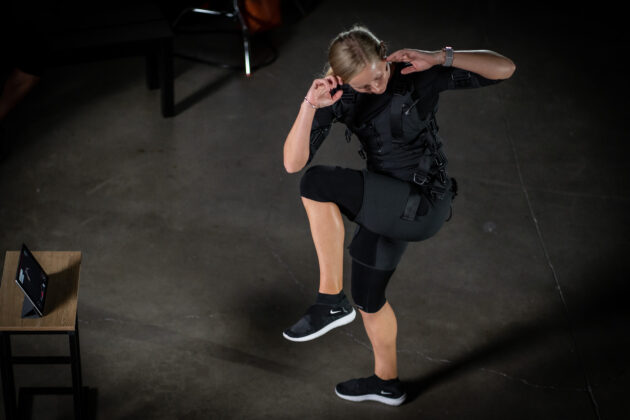
Seattle startup Katalyst has raised $5.6 million for an at-home workout experience that uses full-body electrical muscle stimulation (EMS), a training technique that’s popular in countries such as Germany, Japan and Brazil. The round was led by London-based investor Octopus Ventures, whose partner Jo Oliver sits on the startup’s board.

Katalyst’s business model is similar Peloton, the maker of virtual spin classes and fancy stationary bikes that went public in September. Like Peloton, Katalyst will sell high-end hardware and a subscription to on-demand virtual workouts.
But instead of guiding you on a bike ride, Katalyst will gently electrocute your muscles for 20 minutes a day.
The startup was founded by CEO Bjoern Woltermann, a German telecom executive who fell in love with EMS training as a way to reduce his back pain. He was working at T-Mobile owner Deutsche Telekom and was on the hunt for a startup idea when he decided to go all-in on EMS.
“When I found out it didn’t exist in the U.S., I was like, ‘okay, this is a massive opportunity because the U.S. is the largest fitness market in the world,” he said.
EMS training works by sending electrical signals through the skin to stimulating your muscles — the same basic mechanisms that your brain uses to move your body. Katalyst says the sensation starts out like a massage and that the pressure builds gradually until the muscles fully contract.
Wired reporter Natalie Compton called Katalyst’s experience a “jolty, strange good time.” GeekWire managing editor Taylor Soper tested out a different EMS training experience and summed up the experience by writing, “My butt has never been so sore.”
Anyone could use EMS training to get a low-impact strength workout, but it generally appeals to people who are older, have limited mobility, or are short on time.
Octopus Ventures’ Oliver sees big potential for EMS in the states. “Katalyst will meet the needs of U.S. consumers by combining the efficiency and effectiveness of full-body EMS training with the excitement and convenience of smart, on-demand fitness options,” he told GeekWire in an email.
The original idea for Katalyst was to be a fitness studio where people would come for short workouts. But the company pivoted to the at-home version after customers badgered the company for an easier, more convenient experience.
Recently, two major German EMS companies — Miha Bodytec and Xbody — have received new clearances for the U.S., Woltermann said. “The industry, in general, is coming now,” he added.
Woltermann also thinks the time is right for the U.S. in part because Peloton has paved the way for new fitness models, giving rise to high-tech home workout startups including Tonal, FightCamp, Mirror and Hydrow.
“The consumerization or gamification of fitness is a general trend that we see,” said Woltermann. “High end, motivational content at home paired with fitness equipment — I think there’s a lot to be learned.”
The startup, which has 15 employees, is sending out a limited number of systems to a private group this fall and has opened a waitlist. Woltermann said the system would cost roughly $2,000 and that the monthly workout subscription would be priced at around $39 per month.
While EMS may still qualify as “fringe” in the U.S., it has plenty of high-profile advocates. Bruce Lee was a fan of EMS training, as was depicted in the movie Dragon: The Bruce Lee Story. And soccer superstar Cristiano Ronaldo did an ad campaign with Japanese firm MTG for its abdominal-focused EMS machine.
The FDA, which considers muscle stimulators to be medical devices, has not endorsed any EMS products for weight reduction and warns consumers that unregulated devices may deliver shocks or burns.
“The U.S. is the only country that regulates [EMS] as medical devices,” Woltermann said. “Everywhere else it’s like a blow dryer or a toothbrush.”
Katalyst has FDA approval for the studio version of its EMS system and is awaiting approval on the home version. The company hopes to start accepting orders in the next month and to ship in early 2020.